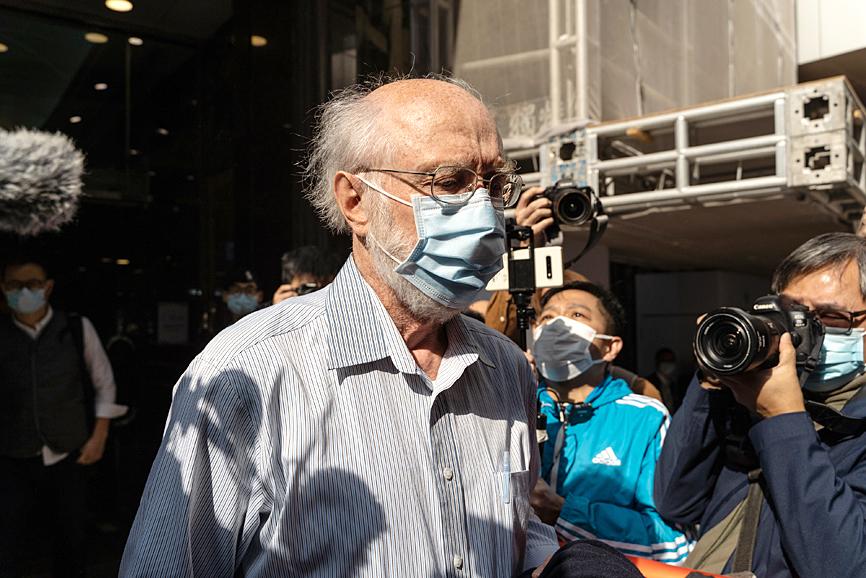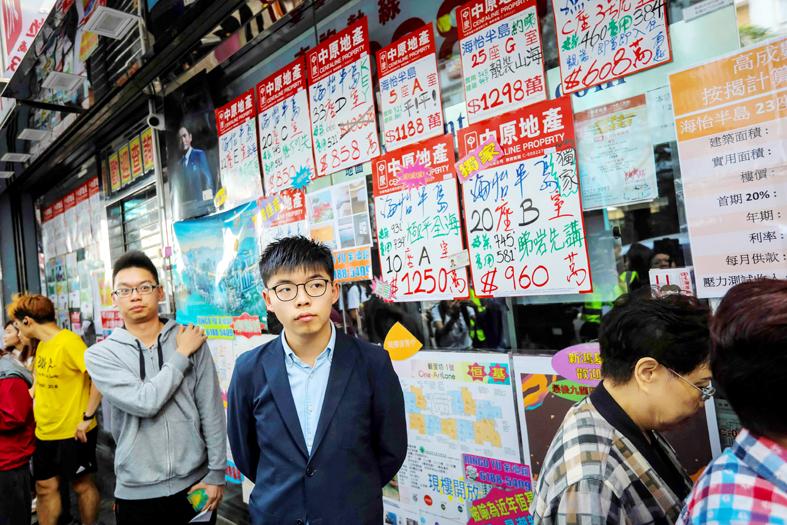One of the 53 people arrested in Hong Kong on Wednesday, the American lawyer John Clancey, has been released without charge pending further inquiries.
Police were expected to begin releasing the remaining detainees yesterday, local media reported, after an unprecedented roundup of politicians, campaigners and activists over accusations that their holding of a democratic poll breached Hong Kong’s National Security Law imposed by Beijing.
The detainees, who include former lawmakers, academics, social workers and students, are being released on police bail pending charges, and would likely have to report back at regular intervals.

Photo: Bloomberg
The arrest of Clancey, a prominent lawyer in Hong Kong, marked the first use of the law against a foreigner.
Clancey, who is the chairman of the Asian Human Rights Commission and treasurer of a group linked to the democratic primaries at the center of the allegations, was arrested when police raided the law firm Ho, Tse, Wai and Partners on Wednesday, a source at his law firm told Reuters.
Local media also reported that activists Joshua Wong (黃之鋒), who is already serving a 13-month prison sentence, and Tam Tak-chi (譚得志), who is in jail on remand, were also rearrested over related allegations.

Photo: AFP
About 1,000 police officers were mobilized to raid 72 premises and arrest 53 people, including 45 men and eight women, aged 23 to 79, “for subversion of state power,” in what was the largest mass arrest since the introduction of the national security legislation in June last year.
It more than doubled the number of people apprehended for alleged breaches of the law, and police did not rule out further arrests.
The 53 were arrested over their involvement — including as candidates — in unofficial primaries held last year.
The primaries drew 600,000 Hong Kongers out to vote for candidates who campaigned on a promise of winning a 35-plus majority in the 70-seat Legislative Council and voting down government bills to force the resignation of Hong Kong Chief Executive Carrie Lam (林鄭月娥).
Authorities suggested at the time and confirmed on Wednesday that they considered this an act of subversion under the new law, which carries a life sentence for the most serious offenses.
Alan Leong (梁家傑), a lawyer and member of the pro-democracy Civic Party, labeled the suggestion “ridiculous in the extreme,” and said the right to vote against legislation was enshrined in Hong Kong’s mini-constitution, the Basic Law.
Pro-establishment Lawmaker Michael Tien (田北辰), a deputy of the Chinese National People’s Congress, also questioned the accusations.
“They’re saying they’ll oppose all [the bills] regardless of content ... however the overriding condition for [the National Security Law] to be in effect is they have to be using unlawful means to achieve that,” he told RTHK radio. “So it begs the question how holding a primary is unlawful ... even establishment parties have held their own primaries.”
Tien said the law probably needed to be redrafted if the authorities were only concerned with punishing people for their motives and not their methodology.
If prosecutors were unable to secure convictions, that would be a “slap in the face” for the government, because it would reveal they do not understand the law, and would further divide Hong Kong society, he said.
Veteran politician Lee Cheuk-yan (李卓人) called the arrests “absurd.”
The alleged crimes “are not remotely close to anything concerning national security, but they still use the law,” he said.

END OF AN ERA: The vote brings the curtain down on 20 years of socialist rule, which began in 2005 when Evo Morales, an indigenous coca farmer, was elected president A center-right senator and a right-wing former president are to advance to a run-off for Bolivia’s presidency after the first round of elections on Sunday, marking the end of two decades of leftist rule, preliminary official results showed. Bolivian Senator Rodrigo Paz was the surprise front-runner, with 32.15 percent of the vote cast in an election dominated by a deep economic crisis, results published by the electoral commission showed. He was followed by former Bolivian president Jorge “Tuto” Quiroga in second with 26.87 percent, according to results based on 92 percent of votes cast. Millionaire businessman Samuel Doria Medina, who had been tipped

ELECTION DISTRACTION? When attention shifted away from the fight against the militants to politics, losses and setbacks in the battlefield increased, an analyst said Recent clashes in Somalia’s semi-autonomous Jubaland region are alarming experts, exposing cracks in the country’s federal system and creating an opening for militant group al-Shabaab to gain ground. Following years of conflict, Somalia is a loose federation of five semi-autonomous member states — Puntland, Jubaland, Galmudug, Hirshabelle and South West — that maintain often fractious relations with the central government in the capital, Mogadishu. However, ahead of elections next year, Somalia has sought to assert control over its member states, which security analysts said has created gaps for al-Shabaab infiltration. Last week, two Somalian soldiers were killed in clashes between pro-government forces and

Ten cheetah cubs held in captivity since birth and destined for international wildlife trade markets have been rescued in Somaliland, a breakaway region of Somalia. They were all in stable condition despite all of them having been undernourished and limping due to being tied in captivity for months, said Laurie Marker, founder of the Cheetah Conservation Fund, which is caring for the cubs. One eight-month-old cub was unable to walk after been tied up for six months, while a five-month-old was “very malnourished [a bag of bones], with sores all over her body and full of botfly maggots which are under the

BRUSHED OFF: An ambassador to Australia previously said that Beijing does not see a reason to apologize for its naval exercises and military maneuvers in international areas China set off alarm bells in New Zealand when it dispatched powerful warships on unprecedented missions in the South Pacific without explanation, military documents showed. Beijing has spent years expanding its reach in the southern Pacific Ocean, courting island nations with new hospitals, freshly paved roads and generous offers of climate aid. However, these diplomatic efforts have increasingly been accompanied by more overt displays of military power. Three Chinese warships sailed the Tasman Sea between Australia and New Zealand in February, the first time such a task group had been sighted in those waters. “We have never seen vessels with this capability